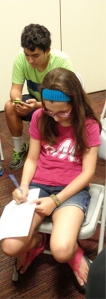 Debi Swedelson Mishael
Debi Swedelson Mishael
(Advanced warning: This is a trick question.) Which of the two students in this picture is on focused on classwork? The answer: Both of them!
 It’s not often that I give a written test in our High School Religious School program. This summer, I have been collaborating with a group of educators in my community. We understand that an advanced assessment of our students will provide valuable information for us both in planning the unit of study and in determining the effectiveness of our instruction. Nonetheless, traditional pen and paper testing does not exactly mesh with my hands-on, interactive, make it fun and engaging teaching style. It’s probably been a decade or more since I’ve given, what most would consider, a “real” test.
It’s not often that I give a written test in our High School Religious School program. This summer, I have been collaborating with a group of educators in my community. We understand that an advanced assessment of our students will provide valuable information for us both in planning the unit of study and in determining the effectiveness of our instruction. Nonetheless, traditional pen and paper testing does not exactly mesh with my hands-on, interactive, make it fun and engaging teaching style. It’s probably been a decade or more since I’ve given, what most would consider, a “real” test.
Last week, as class began, I told my students that we would be starting with a test. After the audible gasps subsided, I assured them that I was actually assessing the class as a whole and not each student individually. They were further reassured when I told them there was no need to put their name on the test. It was less important for me to know what an individual students knows but critical that I know the starting point for the group. I then gave the students a choice in HOW they could access the test. They could use the traditional paper option, or, they could pull out their smart phone, ipad or laptop and, using the url provided, they could take the test as an on-line survey.
Several years back I was introduced to “Survey Monkey.” It is a website that allows you to collect data in multiple ways. The free account provides ample options for teachers. I set up a 10 question pre-test and provided it to students on paper and as an on-line address. I recognize that students have different learning styles so my solution had the added benefit of catering to different modalities. Additionally, with the survey, the results could be accessed, analyzed and shared easily.
As my principal surveyed the room where I was leading a multiple grade program, he looked around to see a third of the students appeared to be texting or otherwise disengaged. With the good-hearted intention of helping me rally the large group of teens attention, he announced, “Ok guys, it’s time to put away all the electronics. Class is about to start.” I stopped him and confirmed that class had in fact, already started and the students were indeed ALL already on task. The boy with his nose in his phone was responding to the same questions as the girl writing feverishly on her paper and neither was complaining! A quick walk around the room proved the assertion.
Surveys are great ways to collect information. For several years now I have sent a survey to parents prior to the start of the year. I ask them some basic questions about their child before the school year begins. This is valuable information that will help me to learn about the personalities and needs of the students entering my room. It shows parents that I am interested in making their child’s learning experience a good one. It also allows me the opportunity to ask parents if they would like to receive a copy of my weekly lesson plans. Typically 90% of parents reply to the survey and 90% of those reply that they would like to see the lessons.
I’ve been called an optimist by many but I’m also a realist. Not in my wildest imagination do I think that all of the parents actually READ those weekly lesson plans. However, I do know that some parents, do read, some of the lessons, some of the time. When they don’t read the lesson, they do at least, read the e-mail I send with the attachment. Even if they only open one of the lesson plans, they see that what I do in the classroom is more than just good Jewish babysitting. They see weekly, that I write lesson plans complete with Big Ideas, Learning Objectives and Essential Questions. They get an opportunity “survey” our classroom without embarrassing their child by sitting in the actual room.
Parents and teachers alike complain about our students who seem to have their electronics super glued to their hands. If we are smart, we can use the mode of communication our student enjoy to our advantage. I know this bulletin post might sound like it should be coming from the Torah Aura technology guru, Adrien Durlester but in my mind, it’s more about my forte, classroom management. After all, it’s not always what you think…technology is merely the tool I’m using this week.

